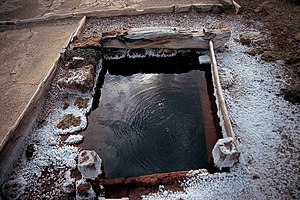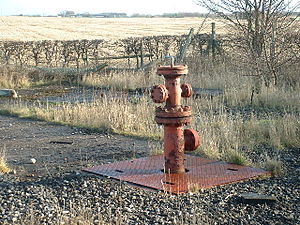We all know the ocean is salty, but did you know there is salt under us all?
The Flood had two water sources, the rain and the “fountains of the great deep”. The more I read, the more I get an idea how powerful and nasty those fountains were.

hypersaline water (brine). View of a spring. Gas bubbles tell us the underground activity of the diapir. Basque, Spain
When I was researching for the earthquake post, I ran into a super cool page about deep wells and earthquakes (You’ll have to follow the link to find out about the earthquake connection). Over in Germany, where there is a huge amount of rock salt under everyone, they decided to drill a super deep well to see what’s down there.
If you haven’t watched the video on the rock salt layers of Europe, I’d start there. The amount of pure salt they have deep underground (up to 2800 meters [9,186 feet] deep) is mind-blowing. But the well they dug under Germany makes these numbers look puny. They didn’t stop drilling until reaching 9,101 m [29,860 feet] under the surface!
Here’s what made me sit up straight and want to share with you all:
Fujita Research Reports: Earthquakes: “At a depth of 3 900 m [12795 feet] the researchers
struck water. A heavy brine with a salinity twice that of sea water, it was at a temperature of 118°C and contained 80% by volume of gases in solution, principally N2(70%) and CH4 (29%). The discovery of this brine led the researchers to postulate a “crustal ocean”, with tides, currents, and flows, all of which could conceivably react to seismic activity.”
I haven’t found anything more about a “crustal ocean”, but have discovered there is a huge amount of salty water underneath us.
Turns out, “Natural brines are commonly found at depth in the Earth”. The Water Encyclopedia says, “they also are found at Earth’s surface, most notably as a byproduct of oil and gas test wells and production wells; hence they are known as oil-field brines.” When we pull up oil, we mess around with the salt water alongside it.
BTW, the Water Encyclopedia is honest enough to admit some deep brines couldn’t have come from the ocean. They admit figuring out how these waters formed is “complex and not completely understood”. I didn’t see anything about melted salt coming up from under the crust as an option, though. Ah, well.
Another name for the water that always comes up with oil is “produced water“. And, boy, is there a lot of it. In the USA alone, 2.4 billion gallons [9.08 billion liters] per day are pumped up. Of course, this isn’t just salt water; there are other things connected with oil dissolved in this deep water, but salt is one of the most common.
One of people’s concerns about “fracking” is the super salty water always there with the methane and how it can leak into our drinking water. Remember under Germany there was lots of N2 (nitrogen) and… CH4 (methane) in the deep water. Turns out this is a common thing.
It’s a little confusing because to fracture the gas out, you pump water into the ground where the methane is, but we also know there is already water there. And we know it’s been down there a long time because nobody is pushing radioactive, super salty water into the ground. But that’s what we get out!
Now, I’ve got to study more on this radioactive stuff. I discuss radioactivity as a reason we don’t live to 900 in my book, but hadn’t heard about the water itself having it.
Out of the same mouth proceedeth blessing and cursing. My brethren, these things ought not so to be. Doth a fountain send forth at the same place sweet water and bitter?… so can no fountain both yield salt water and fresh. James 3:10-12
China is excited about a huge salt, mineral, oil, and gas (methane) area they’ve discovered
K+S Group has a cool page on salt collecting and locations around the world. Just be sure you’ve watched the rock salt video first because they believe the “all salt came from ancient oceans” idea.





6 Comments
SLIMJIM · at
Interesting how you led us to James and our tongue. May our souls be continually sanctified in the LORD to spill out a fountain that is a blessing to others in our speech
Cheri Fields · at
There aren’t too many “salt water” verses in the Bible and I couldn’t help sharing one of my favorite passages. I’m glad you enjoyed it. 🙂
Ernesto E. Carrasco, M.C.Ed. · at
Shared this with my buddy geologist, Dr. Tim Clarey, here at ICR. He used to be an oilfield geologist. I’ll bet he’ll find this interesting. 🙂
Cheri Fields · at
Really? Cool. If he says, “of course, what’s so exciting about that?” then could you ask him for more sources on deep water? I’d never even heard of it until starting this study.
Justin · at
There is a lot of salt that can be seen on the ground here (ND) after the snow melts. We’re in the middle of the Bakken, so there are many salt-water disposal facilities here. There’s one about a half of a mile from our house, FWIW.
Thanks for the article!
Cheri Fields · at
Cool! It’s been remarkably hard to find out about ground salt. It’s way more common than you’d think from kids’ geology books. Too bad they won’t consider a global flood having anything to do with it. 😀
Comments are closed.